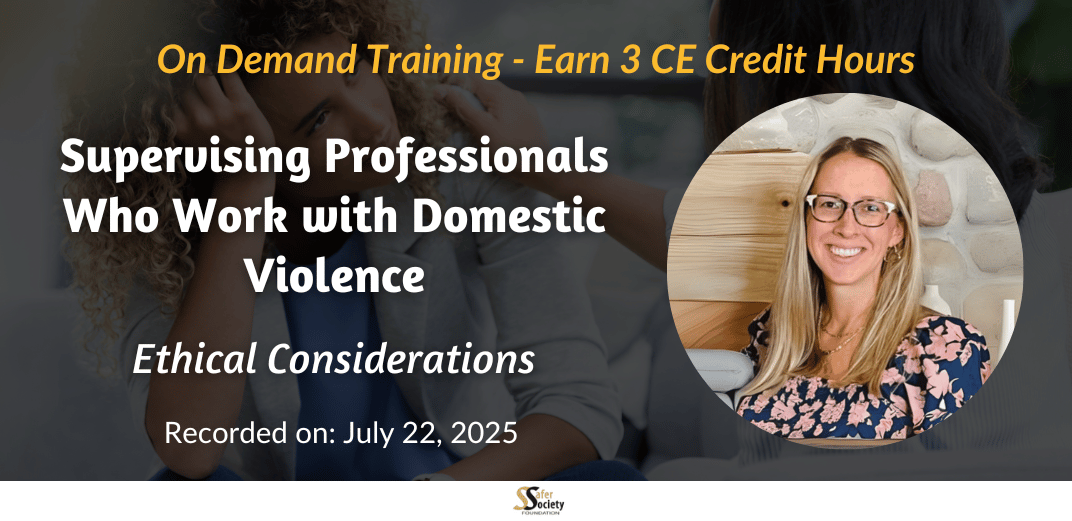
Supervising Professionals Who Work with Domestic Violence: Ethical Considerations
Already purchased an On Demand training?
Click here to access your Safer Society On-Demand Training Center account.
 The codes of ethics of all professions speak to the importance of upholding client autonomy, protecting against harm, and promoting wellbeing. Clinicians in the field of domestic violence—whether they work with those who have been harmed or those who have caused harm—often encounter situations in which the right course of action regarding client autonomy, safety, and mandatory reporting is unclear. Based on her many years of clinical experience with chronic trauma, as well as her work in reviewing domestic violence fatalities for the State of Oklahoma, Lauren Garder developed this training to address these pressing issues.
The codes of ethics of all professions speak to the importance of upholding client autonomy, protecting against harm, and promoting wellbeing. Clinicians in the field of domestic violence—whether they work with those who have been harmed or those who have caused harm—often encounter situations in which the right course of action regarding client autonomy, safety, and mandatory reporting is unclear. Based on her many years of clinical experience with chronic trauma, as well as her work in reviewing domestic violence fatalities for the State of Oklahoma, Lauren Garder developed this training to address these pressing issues.
In this session, Ms. Garder explores common ethical dilemmas and provides guidance for delivering effective services to those working with domestic violence survivors and those who have caused harm. She also offers skills and tools for supervising clinicians, particularly clinicians with limited experience in domestic violence. Through case examples, interactive discussion, and actionable frameworks, attendees gain insight into the challenges of balancing their desire for client safety against the reality that predicting and stopping violence is outside the clinician’s complete control.
This training offers support, clarity, and practical solutions to help clinicians navigate these challenges.
1) Summarize probable ethical dilemmas they will encounter when working with people experiencing or perpetrating domestic violence.
2) Describe clinical considerations for supporting autonomy while preventing harm when working with cases involving domestic violence.
3) Use strategies for supervising clinicians with less knowledge in the area of domestic violence.
Audience
This training is for professionals who work with adults affected by domestic violence, including both survivors and those who have caused harm. This includes mental health clinicians such as psychologists, social workers, and counselors. It will also be beneficial for supervisors of clinicians, especially those overseeing practitioners with limited experience in domestic violence cases.
Content Level
Disclosure
Continuing Education Approval
American Psychological Association (APA)
Safer Society Foundation, Inc. is approved by the American Psychological Association (APA) to sponsor continuing education for psychologists. Safer Society Foundation, Inc. maintains responsibility for this program and its content.
Who's Presenting

Lauren Garder, MA LPC
Lauren Garder is a Licensed Professional Counselor working in Oklahoma City, OK with 10+ years of experience in mental health and victim services. Lauren previously worked for the Oklahoma Department of Mental Health and Substance Abuse Services as the Senior Manager of Zero Suicide and Trauma Care, overseeing the expansion of trauma informed service systems and Zero Suicide Initiatives across the State. During Lauren’s time with the ODMHSAS, Lauren implemented a first of its kind in the nation partnership between a State agency and Family Justice Center to implement a “no wrong door” approach to serving survivors with mental health and substance use disorders and enhancing partnerships between certified victim service providers and community mental health and addiction recovery agencies. Lauren served as the State’s subject matter expert on trauma and specifically supported multiple federal grants as the subject matter expert on trauma and human trafficking. Lauren is CAMS trained (Collaborative Assessment for the Management of Suicidality) and enjoys working with victim service providers to enhance screening, support, and awareness for survivors who experience suicidality.
Lauren currently works in private practice providing individual therapy, training, consultation, and expert witness services. Lauren’s clinical work is mostly with survivors of chronic traumas, including domestic violence, sexual assault, and human trafficking. She has also worked in shelter, transitional, and inpatient settings in Oklahoma and Colorado. Lauren enjoys training on topics related to trauma, trauma informed care, and the intersections of victimization and mental health. As an expert witness, Lauren provides testimony and consultation in federal, state, and civil matters regarding domestic violence and trauma. Lauren has the honor of currently serving on the Oklahoma Crime Victims Compensation Board and previously served almost five years on the Oklahoma Domestic Violence Fatality Review Board.
